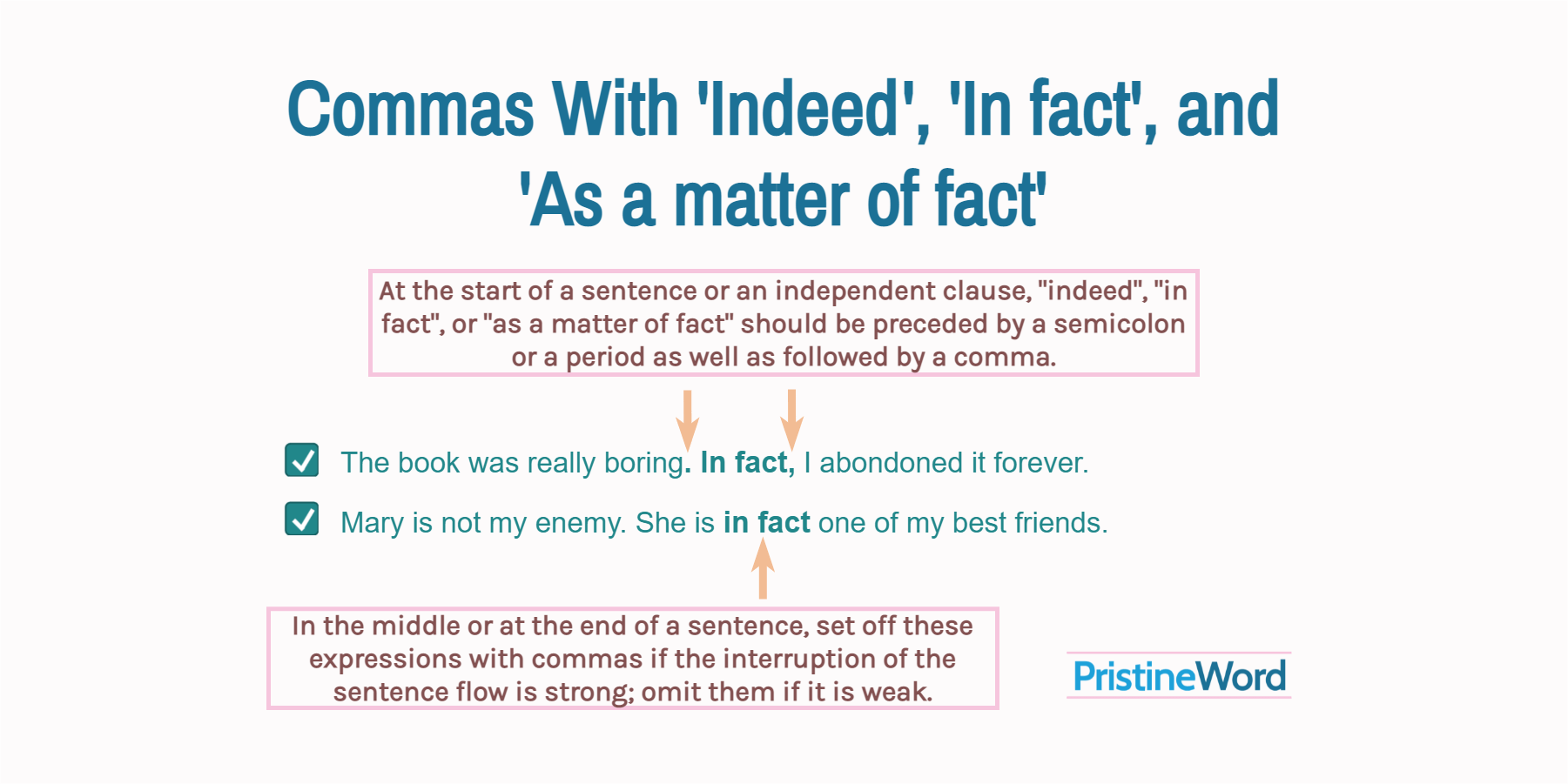At the start of a sentence or an independent clause, "indeed", "in fact", or "as a matter of fact" should be preceded by a semicolon or a period as well as followed by a comma.
At the start of a sentence or an independent clause, "indeed", "in fact", or "as a matter of fact" are commonly followed by a comma.
Russia is a huge country. Indeed, I think it is the largest country in the world by total area.
In the middle or at the end of a sentence, set off these expressions with commas if the interruption of the sentence flow is strong; omit them if the interruption is weak.
Mary is not my enemy. She is in fact one of my best friends.
Mary is not my enemy. She is, in fact, one of my best friends.
Contents
1. Differences Among the Three Expressions
"Indeed", "in fact", and "as a matter of fact" have the same meaning and can be used interchangeably in most situations.
We frequently use "indeed" or "in fact" for confirmation or agreement.
It's extremely hot today. It is indeed.
"In fact" is often used to contradict or modify a previous statement, or just make a subtle correction.
James thinks that I am an engineer. In fact, I am a mathematician.
You can also use "indeed" or "in fact" to emphasize the word "very" followed by an adjective.
He is very tall indeed.
We also use "indeed" or "in fact" to give more detailed information or be more precise about something.
Did Peter pass the exam? Peter was in fact the only student to pass it.
"In fact" and "as a matter of fact" are considered synonyms; however:
- "In fact" is by far more common than "as a matter of fact".
- "As a matter of fact" is slightly more formal and sometimes used to emphasize a differing opinion, frequently in response to a wrong assumption by the other person.
2. Punctuation Marks at the Start of a Sentence or a Clause
"Indeed" and "in fact" can be used to provide a smooth transition between two ideas by connecting a pair of clauses or sentences.
The book was boring. In fact, I abandoned it forever.
As conjunctive adverbs, these expressions modify a clause or a complete sentence; therefore, they generally come at the start of a sentence and are followed by a comma. The comma indicates that the adverb modifies not just the word that follows, but the whole clause or sentence that follows.
Olivia is hilarious. Indeed, she is one of the funniest girls you'll ever meet.
At the start of a sentence, "indeed" or "in fact" should be preceded by a period.
Patricia is intelligent and talented. Indeed, she is leading the new project on environmental sustainability.
Alternatively, these adverbs can introduce a clause instead of a sentence. In this case, the adverb should be preceded by a semicolon.
The exam was really hard; in fact, Peter was the only student to pass it.
More examples
- Gymnastics looks easy; in fact, it's quite hard.
- Jennifer considers herself very smart. As a matter of fact, I am more intelligent than her.
- Susan played well. Indeed, she was one of the best players of the tournament.
- Charles is quite tall; indeed, he is the tallest boy in the class.
3. 'Indeed', 'In fact', and 'As a matter of fact' as Interrupters
If "indeed" or "in fact" are used in mid-sentence to interrupt a clause (rather than join two sentences or two clauses), you can either:
- place the adverb between commas to stress a pause, or
- skip the commas to signal a weak interruption.
I was in fact struggling with emotional issues.
I was, in fact, struggling, with emotional issues.
At the end of a sentence, place a comma before "indeed" or "in fact" to stress an interruption.
He was one of the top 10 investors of all time, indeed.
Alternatively, omit the comma if the interruption is weak.
He was one of the top 10 investors of all time indeed.
More examples
- Shanghai is a very noisy city indeed.
- She is in fact the most intelligent student in her class.
- It was raining all the time. Her trip was a disaster, in fact.
- The tomato soup was delicious indeed.

